#mind you according to some people one of them has no empathy
Explore tagged Tumblr posts
Text
There are only two episodes in book 3 completely dedicated to help fire nation civilians in need. Two episodes who bring perspectives of the fire nation citizens (and not only the royals), the affects of war on everyone, and what is important in order to save the world
Two Aang and Katara CENTRIC episodes
















Two victims of the fire nation, two survivors and the two most empathetic characters of the series :)
#avatar the last airbender#atla#aang#katara#kataang#the headband#the painted lady#mind you according to some people one of them has no empathy#i think you should rewatch this series#two of the best episodes
515 notes
·
View notes
Text
I feel deeply uncomfortable seeing how misunderstood Mike is—not just by the general audience but especially by some fans within the "Byler" fandom, who are supposed to be the ones who understand him best. They are incredibly harsh toward him, wishing for his death, for him to be beaten and humiliated, all because of his behavior in the last two seasons, particularly towards El and Will. This is largely due to his repressed homosexuality and internalized homophobia, but also because of his mental health, which is, in reality, utterly miserable yet so widely ignored.
These Byler fans, many of whom are teenagers or in their early twenties and some even part of the LGBTQ+ community, show little to no empathy towards him. They fail to realize the level of violence that existed against homosexuals in the United States during the 1980s, amidst the AIDS crisis and under Reagan's presidency. I strongly encourage you to conduct in-depth research because it is evident that you vastly underestimate the extent of the widespread, normalized, and, most importantly, violent homophobia of that era. Even people who could have been open-minded were wary of gay individuals out of fear of contracting AIDS, fueled by widespread paranoia and mass hysteria.
I believe Season 1 already paints a clear picture of this atmosphere—through Joyce’s words about how Lonnie referred to Will and through the slurs Troy and his friend used at school. These lines and characters were not included merely for storytelling purposes; they subtly highlight the pervasive homophobia present in the town (and the country) at the time.
Countless gay individuals of all ages in that period preferred to reject the mere idea of being homosexual—along with their own feelings—and would even become homophobic aggressors themselves as a form of self-preservation. At that point, it was pure survival instinct. To avoid being bitten, you bite first.
Now, let’s remove the supernatural trauma from Mike’s context and consider his reality:
We have a child who has been bullied throughout his school years in a small American town during the 1980s, a time when the AIDS crisis was at its peak. His best friend is bullied for appearing/being gay. When Will goes missing, the town—including his own father—suggests that it was expected because he was gay. The only plausible explanations, according to them, were either:
He was kidnapped and murdered by a “queer” (and let’s not forget “sexually assaulted” because one of the most dangerous stereotypes about gay men at the time was that they were pedophiles).
He committed suicide by jumping off the quarry because he was gay.
Everything related to being gay at the time was synonymous with death—whether from AIDS, suicide, or murder for simply being gay. And this violence, hatred, and fear were widely accepted and validated by society.
Now, imagine placing all of these subtle yet deeply ingrained messages inside the mind of a 12-year-old child.
On top of that, Mike’s emotions have always been ignored or minimized by everyone in the series, especially by his parents (even if they mean well). So what do we have? A traumatized child who has been humiliated and relentlessly bullied all his life, who has been made to understand that expressing his emotions and feelings is pointless, that no one listens to him, and that he should stay silent.
Even from the beginning of the series, Mike has always had a bit of an "attitude"—which, when he was younger, was endearing to the audience. But that’s mainly because he is extremely sensitive and deeply caring, yet he struggles to express himself and be heard, as most people don’t listen to him—especially when it comes to his own emotions and feelings. So what does he do? He bottles everything up. He internalizes every emotion until the pressure builds to the point where he explodes—just like in Season 2 when he lashed out at Hopper after being emotionally exhausted and pushed to his limit upon learning that El had been alive the whole time without his knowledge.
Mike’s situation is incredibly complex, with countless factors influencing it: his repressed homosexuality, his internalized homophobia, survivor’s guilt after El saved him, guilt over hurting both El and Will, his complete lack of self-esteem, his unresolved trauma from being bullied, supernatural traumas, the quarry scene (he was suicidal at 12—I repeat this because it still doesn’t seem clear to many people), his fear of losing Will or El again, the massacre at the lab where Bob never returned… I could list dozens of examples.
But do you realize the sheer emotional and traumatic weight he has never "unpacked"?
The only reason people are so harsh on him is that, for the past two seasons, we have had zero insight into Mike’s perspective. We have no access to his thoughts, emotions, or inner world. All we can do is observe him closely, piece together what we know about him since Season 1, and logically connect his behaviors, facial expressions, and words.
But here’s what’s truly baffling: these Byler fans who are so cruel to Mike are supposed to already know everything I’ve just explained. They should understand it. Yet, despite this, they show a complete lack of empathy for him. It’s as if, to them, Mike isn’t allowed to make any mistakes.
Yes, his behavior is frustrating. Yes, he has made mistakes. Yes, he has said hurtful things. But isn’t that what being human is? It doesn’t change the fact that he has always been a kind-hearted person with a huge capacity for love.
I mean, if we’re really going to judge a character’s worth based on their mistakes, should we condemn El for making Max fall over out of childish jealousy in Season 2? Should we blame her for violating Mike and the boys’ privacy by spying on them? Should we hold it against her for outright denying and dismissing Mike’s pain when he said, “I’ve been bullied my whole life,” and she simply replied, “No, you don’t”?
Of course not. We acknowledge that those actions were wrong, but we understand the context and underlying reasons behind them. So why is there such a glaring lack of understanding when it comes to Mike?
Yes, his behavior is frustrating, but ask yourself—would you do any better in his situation?
I’m sorry, but I find it incredibly hypocritical that people normalize insulting and hating this character while completely ignoring the context.
Mike always apologizes to Will when he messes up, which shows that he does reflect on his actions (even if he only does this for Will). He is willing to put himself in danger—even risk his life—to save and protect those he loves. He has a massive heart. He does not deserve the sheer cruelty I see directed at him on Twitter. His actions can be criticized, but he does not deserve to be hated or insulted.
Because the reasons behind his actions in the past two seasons are, in reality, deeply tragic.
Mike is profoundly miserable, and I am convinced he is suffering from depression—especially with the clues subtly left in Season 4, which many fans have picked up on.
I sincerely hope that in Season 5, they finally reveal what Mike has been feeling all along—shedding light on the internal struggles he has been battling silently for years. Whether through Vecna or some other means, Mike needs catharsis to finally heal. He needs to suffer—not for the sake of suffering, but because it is the only way for him to face his traumas and emotions instead of repressing them.
He has been running from his own feelings, burying them so deep inside that they are eating him alive. He is reaching his breaking point.
And that is heartbreaking—not only because it speaks volumes about how poorly mental health was treated in the ‘80s (and still is today) but also because even now, the audience continues to ignore it.
Instead of blaming Mike for his behavior, ask yourself: Why is he acting this way? Why has he changed? Why does he say the things he does?
The answers confirm that, more than anything else—besides therapy and being happy with the man who loves him—Mike needs to heal. He needs to understand that he matters, that he has worth, and that his emotions are valid.
And believe me—if he felt safe enough to express them, he would.
PS : While responding to an anonymous message reacting to this post, I ended up developing even more analysis and depth on this topic as I kept writing. So, consider this post as part 1, and feel free to check out part 2 here, which is even more detailed (and which I’m proud of and spent hours writing, haha).
#stranger things#byler#mike wheeler#stranger things analysis#stranger things theory#byler endgame#mike wheeler analysis#mike wheeler mental health
92 notes
·
View notes
Text
Is Caine human or is it AI?
I've seen people bring up this topic more than once. Also, Gooseworx replied to people that Caine is AI. Therefore, I want to sort everything out on the shelf, what we currently have.
Pilot
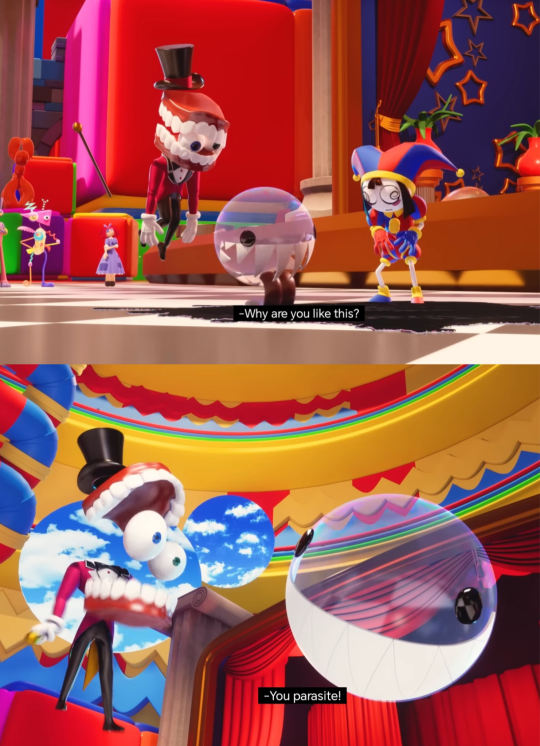
Caine was demonstrated to us with human emotions, which is completely indistinguishable from the NPCs themselves (Candy Carrier Chaos!). And if we take the real existing facts about AI, it is because AI does not know how to: feel, experience emotions, understand the meaning of text and images, be aware of itself.
Let's take the same Moon, Sun and of course Bobble.
They have a completely different level compared to Caine.
Even if he created them, if he cannot understand the empathy of people, then why does it make it difficult to understand other characters "created by him". For example, Bobble, he doesn't understand his actions.
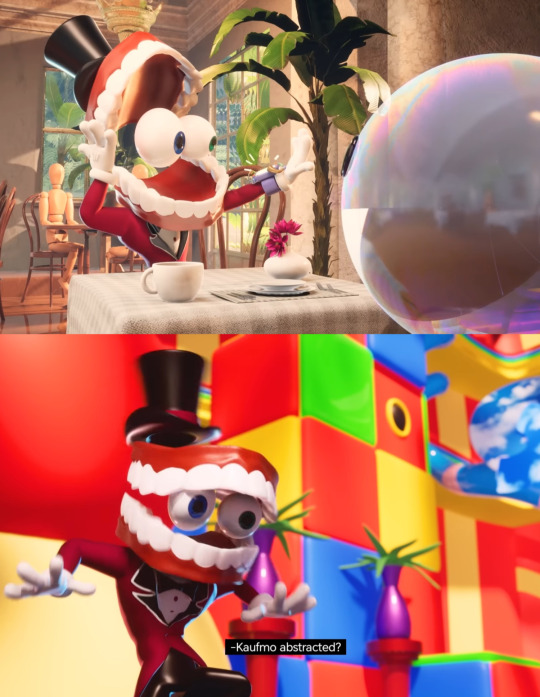
AI has many advantages, but Caine has absolutely NO control over the situation, despite the fact that he is the "creator". Why would he need a "Watch" if all the information should be in his mind?
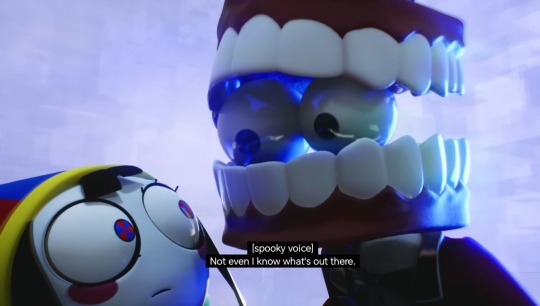
At the same time, he tells us himself that he has many eyes, but at the same time, he was not aware of what happened to Kaufmo.
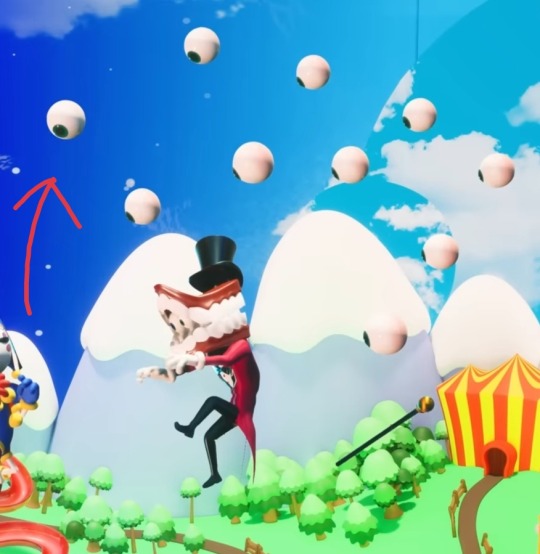
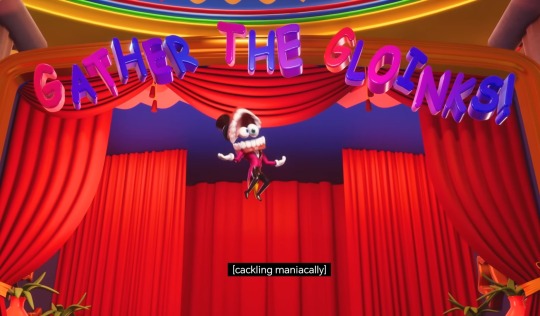
I understand that the animated series is far from real life. But, in fact, AI cannot be insane. Also, Caine cannot emotionally feel "lonely". And all this tells us the opposite, that it is completely different from AI.
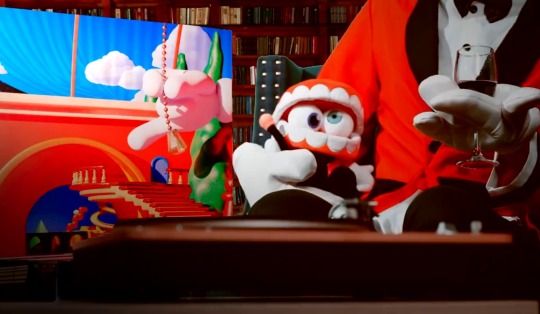
If the director of "C&A" creates AI to help order in the Digital World, shouldn't the company come up with a name for the "administrator" itself? And according to Gooseworx, Caine came up with a name for himself.
It turns out that people "allowed" AI to run amok in the Digital World without fear of consequences? Strangely, Caine should have restrictions, but it looks exactly as if he is completely free.
It is not the first time that the creator answers us that Caine is not a person and he does not have the age given to him. But, isn't the fans' question a strong spoiler for the plot? If we were told "You'll have to wait and see", that would raise quite a few questions. That is, it would immediately be clear what Caine is like.
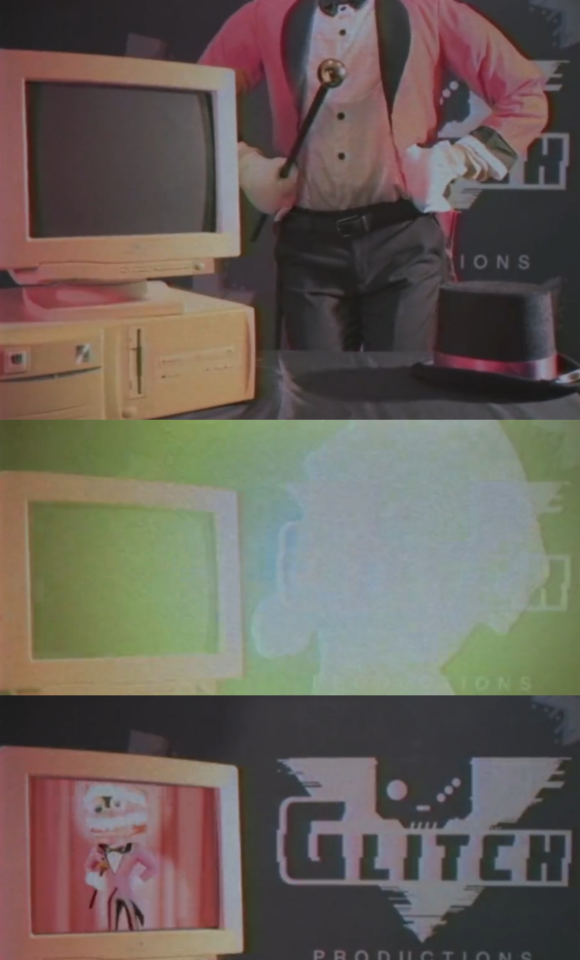
You can also recall a video where a human body is transferred to a computer. Whether this was done for the sake of the fan, or intentionally, we have only to guess.
And one person had the most interesting question. Whether he is the boss, which we were told, we will have to wait and see. If Caine is an AI, then he cannot be the boss, we would have been told that he is another AI.
2:Candy Carrier Chaos!
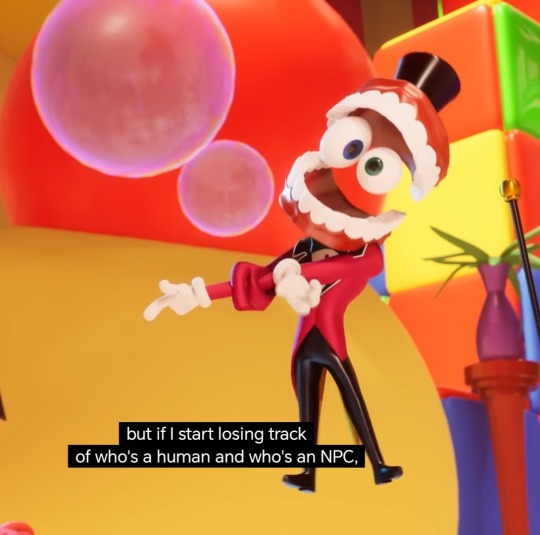
As an AI, he is "obliged" to know who is an NPC and who is a "human". Everything must be programmed for him. But, he doesn't know how to "distinguish" them.
Whether the situation is worth turning against him, he immediately avoids it. Although, he is not forced to run away, because for AI, he must be smart enough to come up with a sedative. But, Caine just comes up with an excuse that he needs to "drink some water." Genius.
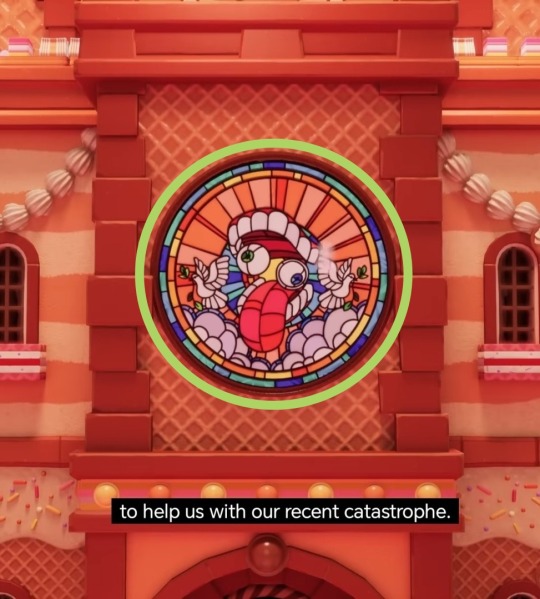
Since NPCs do not realize that they are characters of the computer world, they think that they are alive. If Caine is also presented as a God (and God is so-so with him), then what is the probability that Caine will think that he is an AI, for the entertainment of people? After all, the main characters do not remember everything from their current life (they only partially have upbringing).
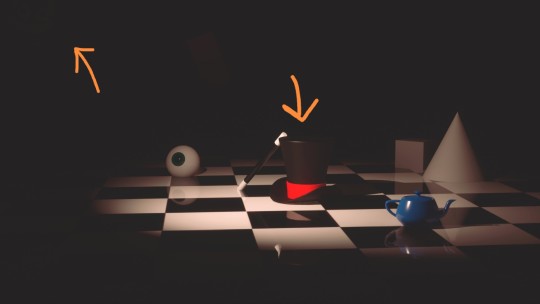
#the amazing digital circus#tadc#tadc caine#caine#tadc theory#the amazing digital circus theory#theory#tadc jax#tadc ragatha#tadc pomni#tadc gummigoo#tadc gangle#tadc zooble#tadc kaufmo#tadc kinger#tadc bubble#my art#tadc princess loolilalu#princess loolilalu
226 notes
·
View notes
Note
Hey Pinnie!
If this question isn’t something you’re interested in answering I understand (or if it’s been answered before; I looked and couldn’t find it, but I may have just missed it), but I’ve wondered about it for a while;
I know Admin is designed to be as blank a slate as possible so the reader can insert themselves into her. That’s totally understandable, and a great system. But what about when the POV isn’t from Admin’s perspective? Like when the reader is Charm, or one of the TCE boy’s obsessions, or ESPECIALLY back during the “Gifted” series, and Admin is being interacted with as a character in her own right?
Do you have any physical traits you imagine her with when she’s a separate character (even if they’re vague, like “short” or “on the larger side”)? What about personality? There have been many iterations of Admin who act very differently- some kinder, some crueler, some more brainwashed while others are less- are any of those ones you consider more “canon” than the rest?
I ask mainly from a place of liking to write characters into this world that aren’t Admin, but do interact with her. I just wanted to know anything about the character of Admin before having a separate self-insert interact with her.
Don't worry! I can go into more detail if you want.
This might get long.
Physically, Admin as her own character looks like this. Though I don't necessarily mind if people want to put slightly different spins on her. She has the height of your average woman, appears to be somewhere in her 20s-early 30s, and is described as "doll-like" at times.
In self-insert!Admin asks, personality will vary according to the energy being used by the asker, thus creating the diversity you mention.
Psychologically, a lot of her attributes as an individual are overshadowed by her crazed, cultish devotion to Krulu. She lives and breathes for this siadar, and it's the most prominent aspect of her entire being. Who she was before is irrelevant. She comes off as secretive when, in reality, there's very little to hide from her part.
Admin is a composed, calculating and oftentimes cold person, who precedes most of her actions throughout her day by asking herself "Will my Lord approve of this?"/"Is this what my Lord asked of me?"/"Am I being productive to The Clergy's Eye?". Her morals, sense of empathy/sympathy and habits are entirely conditioned by the will of another being who she is unconditionally dependent on. Even her posture can vary wildly depending on what she's been ordered to do.
It's worth noting that, although coming off as apathetic and detached frequently, she's not incapable of friendliness or genuine affection, seen in the way she acts towards staff. In her mind's eye, anyone who devotes themself to Krulu is worth much more than the average Joe, and is deserving of care from her part. She considers the staff her closest allies and friends, seeking to reward them for their continued service. However, any tenderness she shows to staff is accompanied by ruthless punishment when considered just or ordered upon her. Admin views punishment as a positive element of her dynamic with the staff, believing it strengthens their bond to her and Krulu.
All relationships she has are marked by some kind of power imbalance, to the point where she might not tolerate being on the same level as someone else. It disorients her.
Some people have asked if Admin is in a romantic relationship with all the staff, and while I enjoy writing that sometimes, it's more probable that Admin doesn't consider any staff member her lover, but that she will use sex and romantic gestures as tools to further secure them in their vows of subservience to her Lord. This isn't to say that it's a chore for her, Admin is a monsterfucker and derives enjoyment from these encounters, which is separate from the euphoria of serving Krulu's will.
In the future, Admin, Belo and Krulu will form the closest thing to a couple in this dynamic. Though Belo will always view himself as inferior to both Krulu and his Lady.
Admin is considered creepy by more than a few people. This comes not from an appearance standpoint, but rather the way she tends to "space out" blankly from time to time. She's not truly distracted, more than likely having a conversation with Krulu. Other factors that contribute to her creepiness but aren't exclusive to her are the way she keeps her calm in the most chaotic of situations, the occasional manic breaking of her cool when she's brought to hysteric states (more often than not due to perceived rejections from Krulu or someone prompting her to lovingly rant about him), and the total indifference to how Krulu may choose to alter her current shape to his liking.
Her indifference towards what happens to other humans inside TCE is almost self-explanatory given her earlier description, though it's worth stressing again that she mirrors what Krulu thinks here too.
You don't feel bad about what happens to those of your kin when they're brought inside The Clergy because Krulu has helped you see the bigger picture. Because you're mentally distant enough to not even think of yourself as human anymore. Krulu certainly likes to exalt your nature as the only good lesser out there, the best of them all- [...]
Being that Admin has no true sense of identity which is separate from Krulu, rejection or outright being discarded by him wouldn't just drive her immediately insane, it would cause her to give up on life. Her purpose is to be his, and if Krulu sees no more use in her, then Admin failed, and her life is pointless.
There's nothing to return to because there's nothing left of her. She doesn't recognize her family, she doesn't truly remember where she's from or what she did before all this. The vague pieces of her past that remain are inconsequential experiences, Ludwig and his brothers. She acknowledges Ludwig has unresolved feelings towards her but doesn't care to feed them, because the past should remain the past- And seeking it out would get in the way of her current life.
39 notes
·
View notes
Text
human au + sentient puppet reader hcs ; wally darling

requested by ; suninwalls (14/05/23)
fandom(s) ; welcome home
fandom masterlist(s) ; here
character(s) ; wally darling
outline ; “Hello! Unfortunately, I was also tapped in a underground concrete box by those puppets. I can't leave! Can I ask for Human!Wally and puppet!reader (a little switcheroo). How would he deal with a sentient or hunted puppet that he or someone else brought to his house. Have a great day!✴️🌟”
note ; i need to refresh myself on the lore after this, but since this is a complete role shift au it shouldn’t be too badly ooc
warning(s) ; human & puppeteer au, mostly fluff!
though your friendship had started off on a… rough note to say the least, once wally has gotten used to the whole ‘sentient living puppet’ thing, the two of you became as thick as thieves
(after all, puppeteer or not, most people would panic if the puppet they just bought from an auction suddenly sat up and started talking to them of their own accord — arguably, if anything, wally handled the whole thing quite well by pushing through his fear to introduce himself to you and ask you about yourself)
whenever any of your stitching becomes loose or one of your button eyes falls out, wally is always there with a needle and thread to do some last minute repairs — he’s not at poppy’s level of mastery over textiles, but he knows just enough of the basics to keep you healthy
he’s brought you on the ‘welcome home’ set a couple of times when you’ve complained about being bored when he’s left you home alone, and you’ve been incorporated into a couple of episode sketches here and there — typically to teach a lesson about empathy, self acceptance, or something else along those lines to their young audience
(it’s always a good laugh, even if it is a bit strange for you to watch your fellow puppets get human limbs, or whole humans in some cases, shoved inside of them in order to bring them to life — like you know they aren’t alive like you, but it’s still a deeply disturbing thing to witness)
(wally has also had to pretend to be your puppeteer to hide your sentience before, which earned him plenty of praise for his vocal range and a very stern talking to from you about warning you before grabbing you by the hemming — you forgave him, obviously, since he’s your dearest friend and the absolute most, but you’ve never let him live it down)
when he’s not working on set, he’s up in his workshop painting something or another (a trait he shares with his most well known character, which you never fail to joke about) — most of the time he just paints whatever comes to mind, other times he’ll start painting you because your puppet proportions are so unusual to him that he can’t help but try and capture whatever thing you’re doing at that moment
his close friends and fellow puppeteers are the only other people who know the extent of your sentience, and they’ve all readily accepted you into their friend group — for better or for worse
for example, julie and poppy are forever planning and crafting up new outfits for you to wear (including a recreation of the wally puppet’s outfit which everyone seemed to find rather amusing) and making sure all of your materials are well taken care of, whilst barnaby is someone who is quick to rope you in to whatever prank he’s about to pull on your dearest human companion — you never really know what you’re going to experience from one day to the next, but you wouldn’t have it any other way
#sleepingdeath#gender neutral reader#fluff#fluff hcs#welcome home fluff#platonic welcome home x reader#platonic x reader#welcome home x reader#wally darling fluff#wally darling x reader#platonic wally darling x reader
111 notes
·
View notes
Note
Hi I hope this isn't weird or uncomfortable or anything but I've seen you talk about empathy a bit before and you don't really feel it normally, right? It just stuck out to me because I also am like that and I've never actually met anyone else before who admitted to it and like, IDK, I guess I wanted to say that I like, see you. You can answer this ask privately if you want (or not at all IDC)
Aw, man. Yeah, that's something I'm loud about specifically because "admitting to it" makes some people label you a Bad Person™ despite 1) the concept of bad people being nonsensical in the first place, 2) it being something that's fundamentally innate and that I can't exactly change. It took me over a decade to come to terms with the fact that it didn't make me a monster so I kinda just. want people around me to know it's okay not to have emotional empathy and it doesn't mean they're predestined to kill people or whatnot. Not having empathy has become normal to me (as opposed to. having been a ~Shameful Thing~ I ~Needed to Hide~ before, I mean) so I'm specifically vocal about it to let other people know it's chill lmao
Gonna dump this here for whoever sees this who isn't aware before I get screamed at about kindness:
There are different types of empathy — grossly, there's emotional empathy (I feel what you feel, the ability to mirror someone's emotions automatically → one might cry because they see someone crying even without knowing the context, for instance) and cognitive empathy (being able to tell, based on logical reasoning, what someone feels → This person is crying, therefore I think that they are sad).
While emotional empathy is something that is typically innate according to most research, cognitive empathy comes up later on and is acquired, in big part during early childhood. Cognitive empathy is something you can (and sometimes need to) work on and improve, contrary to emotional empathy in most cases. It's sometimes called "theory of mind" in developmental science as well!
Compassion, on the other hand, is the conscious act of comforting someone, supporting them, or accompanying them in their emotions. Empathy isn't a prerequisite to being compassionate, neither does it make it inherently easier or more likely.
#normalizing not having emotional empathy one post at a time i guess#and sorry for the psychology dump/disclamer im normal about cognitive science. it's basically copy-pasted from something i sent a to friend#me at 13 thinking everyone who expresses sadness for things that don't affect them directly are faking it: surely my experience is universa#ask#electricchair#shout out to being indirectly told i'm a monster for something i cant control at LEAST once a week
9 notes
·
View notes
Text
You know those days where everything that can go wrong does go wrong? Yeah, that’s what the last couple of minutes of this episode felt like. Jon tried to contain the fears because he’s a self sacrificing son of a bitch and Martin changed the plan in a futile attempt to save him and it backfired and he had to be the one to kill Jon, the one price he absolutely didn’t want to pay. And now the Fears have been released into other dimensions and I’m assuming that’s what the audience is supposed to be: a dimension that the Fears entered and the tapes are explaining why and how it happened. Everything went according to the Web’s plan and nobody’s choices mattered. It won. And Jon and Martin are either dead, somewhere else, or who knows? They became a mystery, the last thing Jon wanted to be.
I do try to look at some positive things when it comes to tragedies and ambiguous endings though. Like, I’m the one who likes to believe Spike lives at the end of Cowboy Bebop or that Dom Cobb makes it to the real world in Inception. And there are two positive things I’m keeping in mind with the Magnus Archives.
First, even though Jon changed a lot and was more of a monster at the end and losing his humanity was something he really feared, I feel like he didn’t lose it all. Heck, he might have become even more human in a way. At the beginning of the series, he kept everyone at arm’s length and didn’t exactly show a lot of empathy. He cared, he just tended to keep it to himself. But as the series went on, we saw more and more that he did care, a lot. He loved and cared so much for the people around him. He made mistakes, but he tried so hard to do right by them. And I know his care for others was something the Fears and Jonah used to manipulate him, but I still feel like it’s important that he didn’t completely lose that, even at the end. He became more monstrous, but he became more human too.
Second, even though Jon was manipulated by so many things throughout his life, there was one choice that I feel like was really his: loving Martin. All the fear and trauma may have pushed them together, but that didn’t mean they had to fall in love with each other. But they did anyway and they made each other better. Martin was finally moving past what he suffered and was believing that he had value. Jon had found someone that would love him no matter how much he changed. And I feel like there’s gotta be some significance in that their last words to each other were “I love you.” Love has beaten the fears before, so maybe it was enough to beat this. And that’s why I choose to hope that they ended up somewhere else, together.
36 notes
·
View notes
Text
Kana’s strong ability to read people comes from her emotional honesty.
And this ability is related to her specific acting style.
In the infamous Ch. 124, Kana keenly points out that Ruby has a co-dependent relationship with Aqua. This is amazing because she points out something that she wasn’t even really aware of--that Sarina is projecting her co-dependent relationship with Gorou-sensei.
She’s the only one who keeps pointing out and admitting that it’s really weird and out of character for them otherwise to be that close.
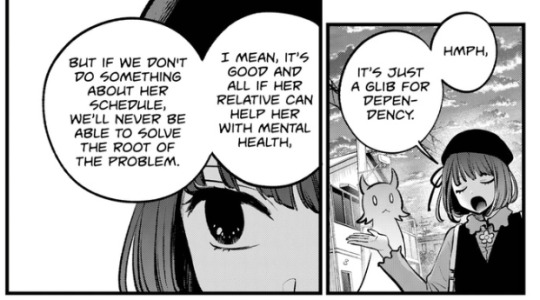
I don’t think a lot of people recognize how accurately Kana points things out about people that we keep passing off as jokes. It seems most people poise Akane and Aqua as being the superior judges of character in the series. But there’s something about Kana’s readings of people that set her apart, and interestingly, it affects her acting.
First our main man Aqua is portrayed as this guy who reads others really well at the beginning of the show, manipulating others into doing what he needs them to do.

According to Kana, his acting style is mainly focused on copying. And it’s true! He thinks of a character that is needed in the situation or by what the director needs, and based on that, he acts it out.
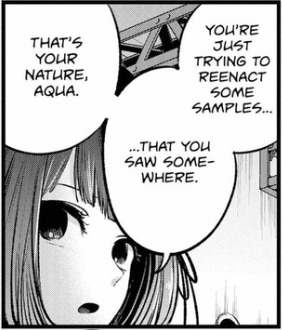
He even copied his mother’s killer on Sweet Today:

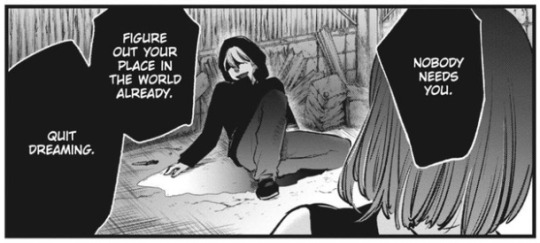
To the point when, in Tokyo Blade, he had to act out Touki being relieved that Saya is alive, he originally acted it out exactly how the manga portrayed it:

Then we have Akane, who can surmise the unspoken details of a person, and extrapolate information about them and make guesses about the decisions they will make.
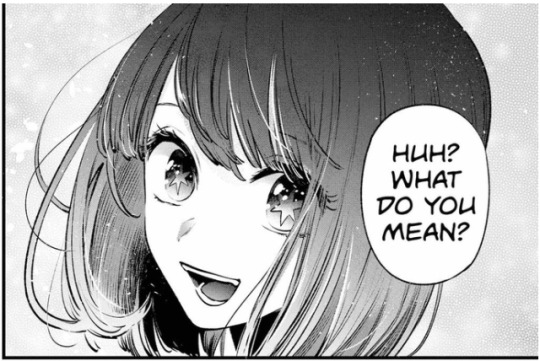
Her acting style is almost like Method acting, where she enters the person’s mind and lives in it for a bit to gain information about them.
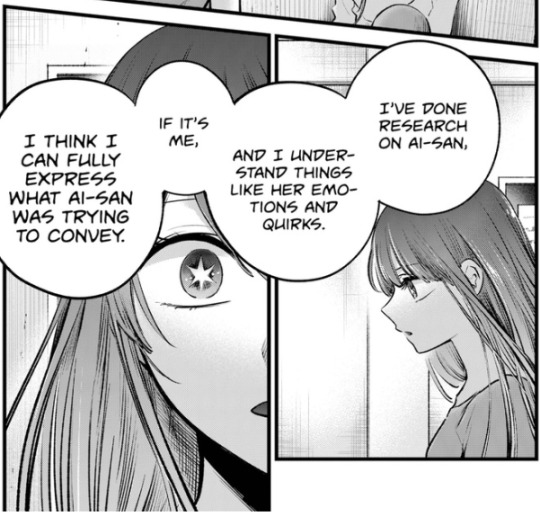
Her method is about intellectualizing the experiences of that person, rather than understanding herself. While this makes her a phenomenal detective with unmatched deduction skills, when there’s not enough information or the setting doesn’t suit her interpretation of the character, she could get stuck from time-to-time.

These two acting styles are largely about trying to make informed guesses and judgement about people and copying those decisions.
Kana’s acting style is Adaptive. It goes farther than simply matching the energy of other people on the scene with her. It also means she reads herself in relation to others and adapts herself to the situation.

In other words, Kana’s acting style is centered on a strong sense of empathy, and an honest understanding of her inner self and how she relates to others.

Her acting is about how she would feel from situation to situation. If she already knows in herself that situation A would yield feeling Y, then she knows the opposite situation B would yield feeling Z. And so on.

Because of how well she’s come to understand herself, she easily understands parts of others that they wouldn’t even admit to themselves.
i.e. Aqua’s actually pretty delusional and thinks himself to be more important than he is, and he has chuunibyou/eigth-grader syndrome:

It’s a trope about teenagers escaping from their trauma by pretending they have some superior ability. And while Aqua isn’t pretending he’s secretly a ninja as in the classic sense of this trope, he does tend to think and act like he’s in a much bigger plot. In a way, Aqua does have the ability to remember facts from his past life, making him a middle-aged obstetrician in the body of a teenage actor, kind of like a vampire on his second life if you think about it--but apart from that, his ideas of being some Light Yagami-esque character who “uses” other people or has some superior detective skills has been kind of a failure. He didn’t crack his mom’s passcode by figuring it out, as much as he just bruteforce attempted every single one, and he didn’t even figure out his father’s identity after all that DNA testing he spent on. Akane had to do it for him. And he didn’t lead Akane to find Amamiya Gorou’s corpse--The Crow did that for Ruby.
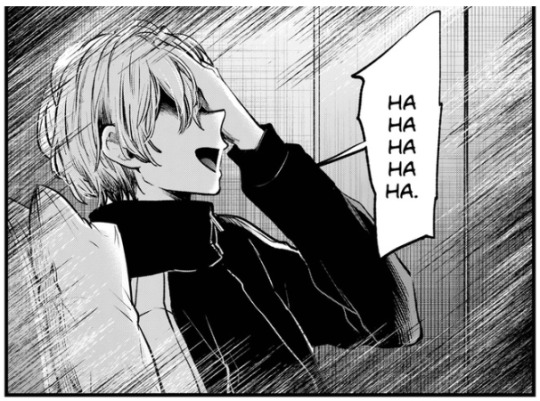
She uses her own personal experiences to understand how deeply someone else would also feel in that situation, even if they try to hide their emotions.
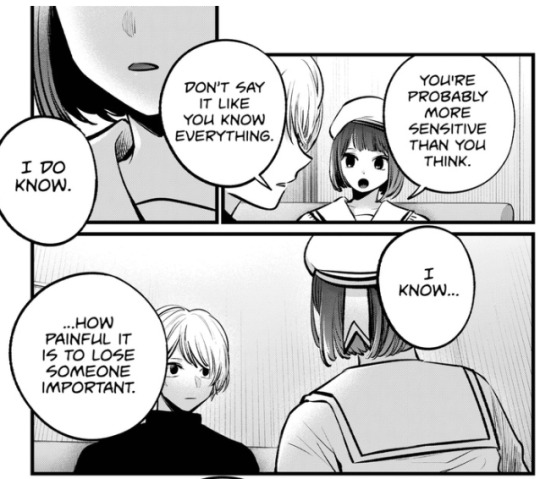
All this is simply to say that, there have been a lot of personality observations that Kana has spoken that has been passed off as a joke, when in fact she’s been accurately describing the reality of the situation out loud.
I think apart from the plot, the emotional beats of the story would likely involve Kana pointing it out (whether to the character or to the reader) that they have a problem they need to resolve--whether it’s Ruby’s co-dependence on Aqua, or Aqua’s inability to express real emotions as he suppresses his trauma, that will lead to them fulfilling the character development necessary to fully resolve their story arc.
I also think that it’s Kana’s emotional integrity and honesty--her ability to understand her true self and have the courage to vulnerably lay that out completely on-screen--that will set her acting apart from her contemporaries and will make her shine like none other.

I have no catchy ending line for you like my previous theories/analyses, except for this:
Arima Kana best girl.
#Arima Kana#Oshi No Ko#Oshi No Ko Spoilers#Oshi No Ko Character Analysis#Hoshino Aquamarine#Hoshino Aqua
251 notes
·
View notes
Text
There has been a lot of discussion regarding c!Quackity, c!Tommy and c!Dream recently, a good portion stemming from the recent video circling around, where it is depicted that c!Tommy not only knew of c!Quackity’s torture but approved.
But while I could write an essay about it (ok yea I did…but) instead I want to shift the focus a bit, away from the same debates we keep having year after year. Because I think we’ve become too focused on the characters themselves over the audience's perception of them and too focused on morality, justification, and right and wrong in a story where everyone is morally questionable. Because at the end of the day it isn’t whether c!Dream or c!Tommy were actually right or justified, it is about - Who you root for and why. It is about (you) the audience's perception of the characters, not the characters’ perceptions of each other. Sure, c!Tommy himself feels justified in hurting c!Dream but do you believe he was.
With that thought in mind I found myself reading a 24 page research paper last night on a psychological study that looked at: What an audience defines as the hero and villain, Why they are naturally pulled to like certain characters and hate others, and What is the audience’s classification of morality in regard to the characters of fiction, where the conditions of morality are often not defined. One of the things shown in the data and line up to real life is that at the end of the day, heroes and villains are not defined on true purity and morality itself. If they were, action heroes and anti-heroes wouldn’t be successful and enticing. And yet, anti-heroes are some of the most beloved characters. In fact, I for one am typically drawn to violent anti-heroes, some of which are the heroes despite being perhaps sadistic murderers and torturers. But if the audience doesn’t simply define hero and villain as ‘good’ and ‘evil’ then what is pulling us toward taking one side over the other?
The answer is actually more complex than you might think. According to this paper, the first thing taken into consideration in a viewer’s appeal or unappeal of a character has to do with what the viewer considers “appropriate behavior.” Simply put, “appropriateness” is basically a social judgment which serves to approve or disapprove of a character’s behavior. This can be based on many things, such as cultural norms, societal code of conduct, your personal morals or experiences. And I think this is key, because I for one see stealing and griefing when I play Minecraft as seriously hurtful things to do (even though you can always rebuild). To the point that if you blow up the house I spent hours building or take my items it can ruin the fun for me entirely. So my definition of the appropriateness of such behavior might differ from people who take those things much more light-heartedly, causing me to disapprove of c!Tommy more than they would for that behavior.
Even further, when it comes to determining their appropriateness of behavior as in whether we tend to approve or disapprove of them we can look at moral domains, which spark our moral intuition instead of simply categorizing everything into ‘good’ or ‘bad’ since not even our subconscious brain is always so black and white. In the research I read, they looked at two sets of domains (aka sets of relating attributes used to measure and compare): The person-perception domains of Warmth (tolerant, friendly, warm, polite, gentle, trustworthy), Competence (intelligence, cleverness, opposite of stupidity, efficiency) and Duplicity (mad, tormented, violent, and tragic), which help to measure our perception of morality in characters as well as the five moral domains of MFT - harm/care (concerned with the suffering of others and empathy), fairness/reciprocity (related to justice), authority/respect (related to hierarchy and dominance), ingroup/loyalty (common good and punitiveness toward outsiders), purity/sanctity (concerned with contamination). According to the research behind these domains, we, the viewer, evaluate characters immediately and without cognitive deliberation. In other words, when characters fulfill domains it sticks with us and when they violate domains it can send out major red flags to us as soon as it happens without us thinking about it, not later in more considerate retrospect. So then, it makes sense that now as we debate we struggle to find common ground because our judgment was made ages ago and it's hard to reason with our already defined moral intuition.
As such, since I started getting into the dsmp first by watching all of the recordings of previous streams in order in this one playlist then going onto watching all of the blueberrytv videos (at the time of course), which edit the streams to allow you to see things from multiple perspectives. Therefore, I watched things from the very beginning, back when it was just c!George and c!Dream goofing off and dying in the nether. So, my intuitive judgment of c!Dream involves him building the community house, always trying to keep the peace between his friends, exploring the world so he can bring back all the types of wood for people to build with, building the prime path to connect everyone's houses together to make for easier travel, rebuilding Tubbo’s house after c!Tommy burned it down, helping c!Ponk when people kept burning down his house. These are just some of the moments I suspect helped to form my evaluation of him. Showing him as being very empathetic and caring, being loyal to his friends and accepting of new people, being a mediator and trying to keep things fair between his friends, fulfilling at least 3 (since he kinda is the authority that is hard to classify) of the moral domains. The streams also depicted the characteristics with warmth as well as competence and intelligence. So immediately my perceptive moral intuition deemed him the hero. As he fulfilled the warmth and competence domains of the one method and most of the domains of the other method without violating them in an obvious enough manner for me to remember at this moment (These are by no means the only reasons why I’d be inclined to root for c!Dream but that's beside the point).
On the other hand, my introduction to c!Tommy was him immediately breaking the three rules, by going around taking down donator’s signs, griefing, stealing, claiming things and property as his, trying to kill people until he ends up being banned. So he hurt others and causes harm, he is invited to join and have fun but fails to reciprocate that by going about and messing things up, he immediately disrespects everyone and defies authority by breaking the rules, hard to say on loyalty though (as mentioned above) him burning down c!Tubbo’s, his best friend, house doesn’t give me the impression of loyalty, concerning purity he scams and lies, is obsessed (though hardly the only one) with male genitalia (which I personally find unsavory) and is disrespectful towards women so definitely failing in the purity and sanctity domain as well. In regards to warmth, I wouldn’t say so, nor particularly competent, though certainly meeting the more violent and aggressive elements of duplicity. So in other words, in just his first few streams he has violated every moral domain, while also not meeting the warmth or competence but meeting duplicity. So immediately my impression of him is to dislike and disprove as my moral intuition labels him as a villain.
In other words, perhaps our affinity for characters and perception of their morality has less to do with actual legal or other measurements of morality but more of what our initial impression was that formed our judgment from the very start. Because at the end of the day, I feel like the discussion needs to be less about whether this character or that character is ‘good’ or ‘bad’ because their motivation or trauma justifies their behavior and more about what qualities do you appreciate about the character. At the end of the day, it's fiction and you should be able to love or hate whatever character you want regardless of morality or right & wrong. It’s your opinion and I don’t see other fandoms shaming and bashing other people for liking a certain character that others dislike and/or the protagonist dislikes meaning therefore they are bad so how can you like them. But in the same way, I should also be able to hate a character without being bashed for not being empathetic to their trauma… Anyways I think the idea that we all see characters as justified and innocent in our own way is cool, especially in respect to the dsmp which is told from all angles, and that’s what I set out to learn more about and share with you. Hopefully, you have enjoyed my findings and I made sense (…..and if it didn’t, you are always welcome to ask or add on :D), sorry for the length I’m beginning to realize conciseness is not my strong suit…
I hope with this interesting angle, we can lean away from discussions on legal, moral, crime, trauma and more towards questions of preference and characteristics and personal perception - Why do you root for them? What was your introduction to the characters? How do you think that impacted your viewpoint on the story? Has your viewpoint ever changed? What do you think helped define your definition of ‘appropriateness’?… etc <3 <3
#dsmp analysis#don’t mind be doing research as a hobby lol… psychology is fascinating… apparently there is a different research paper about villians#which derived the warmth competence and duplicity domains… so I may need to read that ;)……#at somepoint I want to go through every dsmp character and define them as character types -villain hero anti-hero anti-villain…etc#I think it’d be interesting to see where the actual pieces fall based on traits versus just people declaring it doe themselves XD#c!dream#dsmp#dreblr#dream smp#dsmp dream#did someone order an essay?#nope?….oops lol XD#c!dream and c!tommy#c!tommy#dsmpblr#character analysis#(shhh… but if you want me to release the essay I wrote on c!Tommy then ya know…… I will….. >;]#this is fine
71 notes
·
View notes
Text
The Missed Opportunities in Loki Series
While I was writing my review of S2, one of the topics I had problem with, was the redemption of TVA and its agents. I couldn't understand why "not having their memories" and "didn't know they were variants" could possibly be a good explanation for the atrocities they committed. I mean why does it matter? They were still killing people. Didn't they know that?...wait…let me google sth real quick…by which I mean reading interesting articles about the psychology of dehumanization and brainwashing that led me to some interesting results and a new perspective into how the series, especially in S1 missed its chance to explore some of the most important issues of Loki and his backstory.
The short answer to my question "Didn't they know they were killing people?" is "No, they didn't". And not in a racist or bigoted way the humans thinking other humans who aren’t like them, are subhuman. In a literal sense they didn’t consider anyone on the sacred timeline as people.
Empathy for another’s happiness and suffering depends fundamentally on recognizing that the other has a mind minds—that is, the same capacities for thought, emotion, desire, intention, and self-awareness as ourselves. Without appreciating others’ minds, empathy makes no sense[1]
To TVA agents those on sacred timeline weren’t people like them. They didn’t have thoughts and minds and emotions like them. And anyone making a different choice from what was considered for them was a “variant”. For a lack of better word, the TVA had dehumanized anyone but those who were working for TVA which is a necessary perception if you want to facilitate inhuman acts of torture and slaughter.
Dehumanized perception is a cognitive bias characterized by spontaneous failure to think about mental contents – thoughts and feelings in a social target’s mind. [2]
According to TVA propaganda, TVA and its people were created by the Time Keepers. They were different. They weren't like the ones on the sacred time line. The chaotic and disobedient "variants" should have been "pruned". None of them mattered except the right order of time.
The only ones TVA agents considered as people were each other. They were friends and coworkers and cared about each other's lives. And they had no memory of their previous life. But when they found out they are variants themselves, they realized “Those we were killing were like us. They had minds and emotions like us. We’ve been killing people all this time”. This should have been the explanation for their change and redemption. Their memories were taken from them and they were brainwashed by a propaganda that dehumanized anyone else and let them commit those atrocities easily. It shouldn’t have been “they’re variants themselves” but “the variants were people like them”.
So, while TVA can be compared to a totalitarian regime, there's probably no exact irl example for TVA agents because their situation for the most part is fictional. But perhaps the angels and demons in Good Omens have a close mindset to them. They care about each other but not the humans. The humans are just a tool for them to start the final battle according to the great plan.
This would have been easier to pinpoint if TVA was framed as evil from S1. Also if you want your characters to be likable or redeemable give them personality and show that they're doubtful and uncomfortable with what they're doing from the start not when they find out the truth or in the last episode of the last season! And don't frame torture and dehumanization as sth hilarious, therapeutic and deserved for one character and completely opposite for another character if you want to reach the conclusion that those actions were atrocities.
What bothers me more is that they missed a perfect parallel and opportunity to address Loki's identity issues. I don't even think the parallels were intended, considering how much the show is indifferent to them.
First the parallel with Loki finding out about his heritage. He was stolen from his homeland, grew up learning to hate and fear his own race. Like Loki people in the TVA didn't know about their past. Like Loki they would have an identity crisis. This was explored a little in S2 but they failed to make the connection with Loki's past. I mean you could let Mobius call Loki an ice runt as an insult, but didn’t bring up the topic when he had an identity crisis and talking about it with Loki? Although maybe that's too much expectation from the people who treated Loki being adopted and not knowing about it as sth unimportant, and didn't mention the racism and favorism he grew up with even once.
The parallel isn't accurate though since Loki weren't going around killing frost giants. He even didn't really consider them less than Asgardians. Not until he thought that's how his family actually sees them. That was his breaking point.
"You could have told me what I was from the beginning. Why didn't you?" "To protect you from the truth" "Why? Because I'm the monster parents tell their children about at night?"
This is the reason Loki went on his genocide attempt. To prove to Odin he wasn’t one of the monsters. That he was an Asgardian. That he belonged with them.
The second parallel with Loki's story that they failed to address is Loki being brainwashed by Thanos. You want to say your characters are redeemable because they were brainwashed? Show it! Make a connection with the main character's backstory. How they have missed this chance is beyond me…On second thought, they probably didn't even connect the dots, because they presented torture and brainwashing as a positive thing.
Brainwashing is the process of manipulating a person’s beliefs, thoughts, or actions through psychological manipulation. If a person is brainwashed, they may no longer be able to think for themselves and may act on orders without considering the consequences. Brainwashing is often used by totalitarian regimes to control their citizens, and can also be used in cults and other groups to manipulate members.[3]
Some people are more susceptible to brainwashing like people who are going through a difficult period in their life or a change that may or may not be of their own making[4]. It is also useful to consider identity when it comes to brainwashing.
Someone experiencing an identity crisis is in desperate need of a new identity. Because brainwashing promises them a new identity, it makes them more susceptible.[3]
Through the events of Thor 1 Loki’s going through an identity crisis. All he ever knew his life were lies. Even his skin was a lie. At the end not being accepted by his father no matter what he does, he commits suicide. That’s when he meets Thanos. And Thanos and his allies through torture and using mind stone, brainwashed Loki. People who go through brainwashing give up their previous identity and adopt a new one.
The person’s thinking and behaviors are altered by the indoctrinated beliefs that support their new identity. The individual changes into a whole new person, in some cases.[3]
This change in personality and ideas is easily noticeable in Loki in Avengers vs the other movies. The way he talks in Avengers is eerily similar to the way Ebony Maw talks in EG.
This could be a parallel with how TVA agents memories’ were removed and replaced by propaganda. But no mention of what happened to Loki during his time with Thanos. Nothing.
What’s interesting though is that when you read about how brainwashing is done, there isn’t only one example of it on screen. There are two. The steps for brainwashing are:
1.Isolating the victim
2.Degrade the target
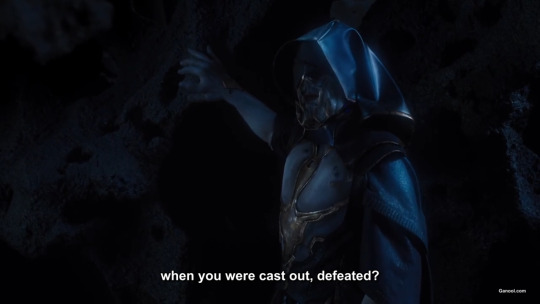
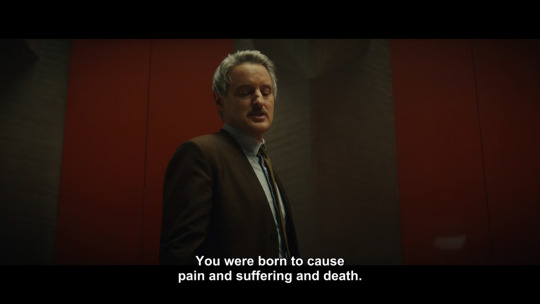
3. Promise a better identity
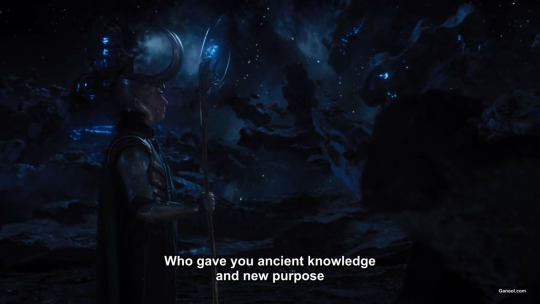
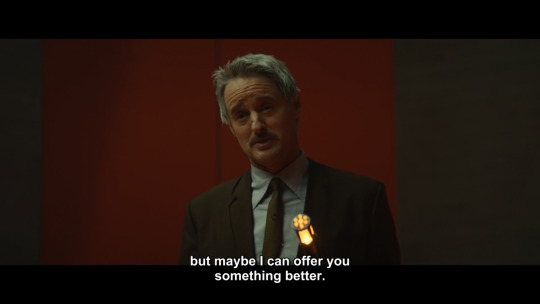
4.Offer rewards

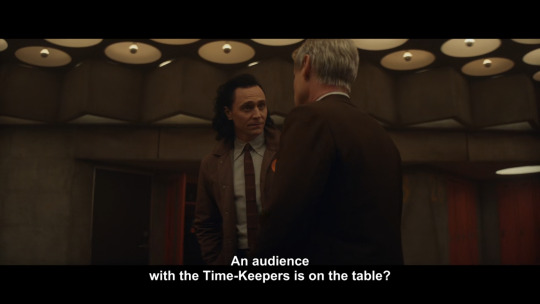
What Mobius was doing in S1 wasn’t therapy unlike what the writers claimed. It was brainwashing.
Another interesting point is that the way Loki treated Mobius was the right way to undo brainwashing. Those steps are separate the person from their group, be on their side and question their beliefs like what Loki did during 1x02 and tell them they’ve been brainwashed like what happened in 1x04.
I find it really funny though that every time they try to show what a villain Loki was and that he needed the guidance from these heroic™ people, he turns out to be the most moral person in the group if you look at the story objectively. Loki befriended and tried to help the people who arrested, tortured and tried to brainwash him, even before he knew they were variants.
In the end, I don’t give the credit for these parallels to the series. Because I don’t think they were intentional. Otherwise, they would have delved into Loki’s past and compared it to what happens in the show and wouldn’t have disregard it completely. What a huge waste of opportunity.
Sources:
From Dehumanization and Objectification, to Rehumanization
Dehumanized Perception
How To Undo Brainwashing
How to Recognize and Avoid Brainwashing
54 notes
·
View notes
Note
Hello!
Thinking about that AU you mentioned where Sora manages to get out before 1234ji are modified when she’s pregnant— or well, mostly something adjacent to it. What if she made it out just a tad too late?
They still end up modified, but she prioritizes getting out of there whilst still pregnant and taking the poison when she’s around people who actually have her and her childrens’ best interests and health in mind. It still doesn’t fully work just like in canon, 124ji still end up mostly emotionless, but Sora feels at least grateful she did the heavy lifting and they get to be raised away from Germa and all its propaganda, toxicity, extreme utilitarianism. They’re a nightmare to raise in some aspects, but they grow up around people who care for others and show them how to do the same even if they don’t have the empathy or emotional range to personally feel anything about a lot of it.
So Sanji has his three brothers who sometimes say strange things and have very weird internal logic/framework to do certain things, but they’re Mostly Fine.
It's a good AU! I love it so much and I love this version you've created. According to Reiju's vivre card(here is where you can read it) she learned emotions and empathy from Sora. Which brings up that even if the poison didn't work they still have to learn emotions and empathy-But we'll get there!
Sora in her desperation after the modification and having the poison being able to get her location to her soulmate. So when Mihawk shows up a few days later and gets her and Reiju out. They're like twenty three when this is going on by the way. So not only are they young parents, one of them is a running royal and the other is a guy who has the moniker 'marine hunter'. Sora is actively explaining her plan to Mihawk who is just convincing her to wait until they get to the island he's secured. She just agrees and holds Reiju who is still learning emotions herself and is confused by that guy but then she gets to hear about soulmates and soulmarks and see them both. Mihawk's sky and bird and kotagana in front of Yoru on Sora's right fore arm. Reiju pokes the bird on Mihawk's chest and says 'that's mama' and Sora laughs at the nervous look on Mihawk because Mihawk with kids under like... seventeen are not his forte, a three year old is outside his wheel house.
So they get to Kuriagana and Sora takes the poison and Mihawk takes care of her and Rieju through the worst of it and helps her get better. Eventually the kids come and only one has a soulmark so they know what happened and it breaks their hearts but they also see how Reiju is learning so they make it their mission outside of their other dreams. Of course learned emotions and empathy can still be tricky and they still say some out of pocket shit and do those actions because they don't process fear like Sanji or Sora do, but Reiju and 124ji still understand emotions to an extent.
Are they still a nightmare to raise? Absolutely. They're quads and over time they understand Sanji isn't like them and can break and be cut unlike them. The mischief is high and without a lot of self preservation it's a hassle to keep them and Reiju alive since they don't have guards or supervision 24/7. Then you add in it's five on two and four of them are modified? Mihawk and Sora drink five pots of black coffee a day to keep up with them.
#answers#loved!sanji#soulmate au#hawkeye mihawk#dracule mihawk#dracule mihawk x sora#vinsmoke sora#the vinsmokes#vinsmoke siblings#mihawk x sora#black leg sanji#vinsmoke sanji#1234ji
31 notes
·
View notes
Text
Dream team +Karl Jacobs headcanon's
Toxic boyfriend
Story g: Theme +18/ nsfw / angst
Language: English/Inglés
⚠️: Manipulative behavior, teasing, toxic behavior, insecurity, poor mental health, forced sex
CC's: Dream, Sapnap, Georgenotfound, Karl Jacobs
Reader g: Neutral reader
📝: All the content is fictitious and an attempt is made to adapt the PUBLIC personality of the cc's, that is, the personality that is shown in front of cameras, I do not know the true personality and any resemblance to reality is mere coincidence.
🍒: Hello, writing requests are always open, if you want something in particular, ask without fear. I clarify that English is not my main language, I apologize for any error and I accept corrections to improve the quality of the content
Master list

Dream
•He has money, so his main toxic behavior would be to buy you what you want and then make you feel guilty.
•Like he bought you some new sneakers, you stained it when you went for a walk with a friend in the park
•And he'd be like "wow you stained them and I just bought them for you, you don't love me enough to take care of the gifts I give you."
•"I bought this set of lingerie for you so we can have some sex today, are you seriously going to say no just because you're tired? I went to the mall, spent hours choosing color and size, paid a lot and you' re not valuing it
•You ended up agreeing and while he was fucking you he kept telling you how ungrateful you have been to him
•"I won't buy anything else for you again, I spent a lot on this lingerie and I don't even see you happy to wear it"
•He would break the lingerie on your body because apparently he did not make enough effort and there is no point in you continuing to use it
•He would keep fucking you with a lot of anger
Sapnap
•He would not stop comparing you so that you agree to do what he asks of you
•Sapnap is a boyfriend who is sexually demanding
•He would always ask you to have sex and be careful if you deny him
•"I understand that you're tired, I'm just not used to receiving no for an answer, my ex never refused and that you tell me NO, it surprises me"
•If you are not together he would ask you for nudes and if you say no
•"My ex always sent nudes before going to sleep"
•"When my ex sent me photos always thought of her/him, I would like something like that with you"
•Or he would do it with other more everyday things
•"My ex cooked for me instead of ordering food at home"
•He would compare you because he knows that he is handsome, he has money, he is famous and more, so in his mind he thinks that you would try to be better than his past relationships so as not to lose him.
George
•He would be very jealous
•He would have very little empathy for you
•For him, all your friends are unnecessary in your life because you have him.
•According to him, your friends have other intentions with you.
•"Yes, this friend of yours is only with you because you are the one who takes the initiative to go out together"
•"Did she ever do something for you the same way you just did?"
•"Okay, in the end they are your friends, you know what you do and who you get involved with"
•If it's about fighting with other people, he wouldn't listen to you in your feelings.
•"Don't talk to me about how you fought with your friend, I've always told you that these people are not a good influence on you"
•"If you didn't listen to me, then I don't want to listen to you"
•He would try to get you to become friends with his friends just to have control that "nobody influences you badly"
Karl
•Would you be ready to go out with your family or friends
•He doesn't want you to go
•He doesn't like you spending time with other people than him
•Karl just "Don't be too late, I think I'm getting a fever and I'll need you here soon"
•His plan works and you say about staying home
•"No no, go honey, I think I'll be fine, I hope don't die by the time you get back"
•If you were to leave, when you returned he would be lying on the couch with medicines that he did not ingested because he did not need them
•He would be angry
•Despite the fact that he "insisted" that you leave, he would be upset that you left without caring that he was sick
•"I understand that maybe that dinner is more important than me"
•"I spent all this time throwing up and you left without caring"
#dream team#sapnap#georgenotfound#dreamwastaken#karl jacobs#dsmp dream#karlnap#dream fluff#sapnap fluff#gnf fluff#gn reader#x reader#ns/fw blog#sfw blog#dsmp#dream not found#knf#snf#dnf#dnn#male reader#youtumblr#mcyt x y/n#sapnap x you#sapnap x reader#dream x you#dream x fem!reader#gnf x reader#karl jacobs x reader
82 notes
·
View notes
Text
One of the things I find most intriguing about the characters in Hazbin is the potential that the technical inhumanity of them brings.
Let me explain.
Something you see pretty much everywhere in this fandom, like in all fandoms, is people choosing specific characters to relate to, to project onto or generally sympathize with, and that is ofc totally normal and good for any type of media really. Often media is judged by how well you can identify with the characters in it (and based on that how real they feel) because we love to see ourselves portrayed on the screen, either how we would like to be or how we currently are/were, giving us the feeling of being recognized and understood. There are of course many, MANY more psychological aspects to this but you get what I mean.
Now, most of the time this works really well, because pretty much all media has humans for their main characters, which obviously follow the same psychology as ours, or at least they have non-human characters which are portrayed with mostly human minds. There are some excpetions to this, usually found in sci-fi movies and series (honorable mentions go to Star Trek and Babylon 5, although I find the latter does a better job at this), but even then there are many human charactaristics to morale/ethics/etc found.
But back to Hazbin Hotel.
Here we have a series set in hell, the place where sinners (according to christian rules) go, but of course not just anyone who's sinned but more specifically unrepentant sinners. (This is again a very simplified answer, but I'm not trying to have a discussion about theological accuracy of anyone's or any religion's understanding of who exactly goes to hell or not here, so we're running with this.) Essentially we have souls ranging from having been just a person who unapologetically sinned to actually Hitler-esque living in this place for pretty much eternity.
Notice how I said souls, not people.
Because people, by definition, refers to a number of humans, and as we can clearly see from for example the designs of these characters, they are no longer humans. And that finally brings me to my point.
Bear with me here, bc I'm not entirely versed in the Hazbin lore, so I don't know how much of this is already established, but the way I see it, souls, upon entering hell, loose their humanity. They may retain some aspects of their previous personality, most likely moreso the evil ones or to be specific the ones that caused them to go to hell in the first place, they might even keep some of their core memories from life but judging by how many things we forget even whilst still living I can't imagine death to not have an impact on that, and severely so. All in all they're totally new beings though.
And what makes us think that these totally different creatures, which are on top of it (usually) inherently evil, function, think, or feel, in any way similar to how we do?
There's no reason for them to be able to feel things such as remorse, empathy, or even love. And that’s what I find fascinating, that this could technically be a world with exclusively psychopaths (though that’s of course not a wholly accurate term in this case) and how that would function. Going even further, with this in mind, the way some of these characters act makes total sense - and I'm specifically talking about the "antagonists" here of course, like our collective fan-favorite Valentino.
This is, of course, just my own personal view of this, but for someone who's always enjoyed the darker parts of content in fandom this entire setting is just. Perfect.
BUT, and here comes the really big but, exactly those things I mentioned earlier they technically shouldn't be able to feel, (remorse, empathy, and love) are all things we see characters on this show experience. Y'know, the things that I said are human emotions. And that brings me to my BONUS POINT of this endless rant, which is about Charlie and the entire premise of this show. Because she might not even realize this, but Charlie is not actually trying to redeem demons for the sake of making them into angels. She's making them back into humans.
#this turned out so long but I have just so many feelings about this#if you read this whole thing thank you for coming to my ted talk#hazbin hotel#hazbin hotel meta#hazbin hotel theory#pro hazbin hotel#or whatever it is I need to tag so critiques don't have to look at this post#I mean they can but they prolly won't enjoy it so#rhino rambles#I AM ALSO NOT SAYING DON'T RELATE TO THE CHARACTERS I JUST THINK THIS IS COOL
30 notes
·
View notes
Text
The unsaid (Tenma x Grimmer)
NOTE: ENGLISH IS NOT MY FIRST LANGUAGE, SORRY.
♡♡♡♡♡♡
The irritation he felt in his throat gave him no respite day or night; but it did not compare to the mortification of suddenly expelling petals so frequently the last few days.
He suspected what illness was afflicting him, why and by whom. He knew that illness of unrequited love, but he did not believe that, of all the human beings on the face of the earth, he was the one who experienced it. His ability to love was zero according to his own experiences; It was a miracle that he got married and had a son who had died, that outcome made him know how fucking broken he was. For feeling extreme pain?
The opposite, in fact, couldn't feel a damn thing; He did not cry for the loss of his son, which caused his ex-wife to see him as a being without a trace of empathy and warmth.
He was an anomaly in the world, a monster that created Kinderheim 511. It wasn't his fault for having been raised by an experimental orphanage where his childhood was flayed, but he was responsible for managing his own emotions. That was the problem: he didn't grow them successfully, and that made him look like a miserable man in some ways.
The most ironic thing was that when he thought he could never feel like others, he was wrong and, judging by his symptoms, he was feeling fervently.
More unexpected was the reason why he began to feel anemic both physically and mentally. Tenma was a comrade who supported you in any conflict, no matter who you were; Even if you were a scourge of society, the doctor would never look down on anyone. A shepherd who led the lost sheep back to the flock as God commanded.
He had gained a belligerent side after learning that he let Johan live; Germany's monster and Europe's most feared killer. Tenma also bled emotionally, but he never let his spirit be eaten away. What a more ethereal being the Japanese was. It wouldn't be mutual.
Leaving out the fact that Tenma was straight and, even if he wasn't, his reputation would be undermined by their hypothetical relationship; The most important thing is that they were both a pair of melancholic people, aged at heart, exhausted by visceral experiences, and they were not even convinced if loving after all would be ideal. The scalpel would be his savior, he immediately thought. A part of Grimmer wanted to tear his feelings for the Japanese to shreds; The other wanted to delve deeper into this because, even though it was unrequited and began to burn unpleasantly in his system, he felt alive. It would be a whim to remain with this feeling for that banal reason; It would also be to get rid of it to avoid pain.
Choosing to die seemed radical to him, and it was not beautiful as others paint it, not even he was as self-pitying. However, a lump formed in her throat at the thought of concluding her love for the doctor. What else could the poor devil do? The thorns of the flowers touching his lungs overwhelmed him at a certain time of day. He thought it was some kind of signal to hurry up the surgery, and he already knew who was going to perform it.
“You should have come earlier. You know that right? “ His paternal scolding melted his reasoning at this point.
“I know that love is difficult, but there is always a solution for this type of bad things. Anyway, who is she?”
》He, Kenzo. And he is you. 《
He notified his mind quickly, but he did not have the courage to expel this out loud.
“Irrelevant right now,” he urged.
“It's not the kind of thing you go around telling about; You have to respect the privacy and identity of a lady.” Grimmer learned to pretend very well.
Kenzo shrugged.
"It's not a bad thing to fall in love, Grimmer. It's actually a blessing after a turbulent life like yours. I wish I had the same luck sometimes, but you see, no one has come to claim that position. I'm not in a hurry, really; It's not like I want to go through that stage again. I guess marriage wasn't for me. But you, maybe you have time to get married again. Don't waste it.”
Every word he heard translated into a pang against his ribcage. He was assaulted by a volley of coughs that came accompanied by petals, this time blood spurting out next to them.
The Japanese man soon took his friend to the bathroom so he could vomit without restriction. Tenma lightly tapped the opponent's back, as if that action would decimate the ordeal that the tormented man was suffering. After a few minutes, Grimmer was sitting on a grayish sofa with flecks of gold and sky blue. He should have felt comfortable, but he only felt chills invade his spine and his head hurt a little.
"You must get this out of me soon, or I'm going to become insane", he warned to the Japanese when he offered him a cup of cherry-lemon flavored tea. The doctor frowned at the comment.
"You didn't even make an attempt to conquer that woman, what a shame."
He shook his head, but gave him a smile. His companion pondered for a moment, before responding in a half-defeated voice.
"It seems to me that she had someone else, that's why I didn't court her." The German lied again.
“Oh, yes? I'm sorry for that, it would have been comfortable to see you in love” Tenma highlighted, “But you didn't tell me what her name was, come on. Who was the lucky one? Maybe I know her,” he insisted.
The journalist was emotionally drained. He resolved the conversation simply.
"I'd rather keep that to myself if you don't mind, buddy."
He winked, forced by himself.
Tenma agreed.
He then instructed him to ask his secretary to schedule the operation within a few weeks. Honestly, Grimmer's stomach clenched just thinking about it, and he felt the thorns cling to his insides, as if thereby persuading the German to let them reside permanently.
No way.
●♡●♡●♡●♡●♡●♡●♡
It was exhaustive, but it finally happened. The root of the problem was annihilated, but now the former spy felt like a broken shell; he didn't know the result was going to feel so overwhelming.
The regret of not confessing the truth to Tenma suddenly hit him, he had nothing to lose but he acted cowardly. Perhaps it was the unconscious fear of rejection, or of ruining a friendship with the surgeon. In any case, the operation was irreversible and, after a few weeks, his life began to feel stable again. If he had told Tenma the truth. If only he had...
♠︎•♤•♠︎
Tenma buried the withered flowers in his garden; He thought he would be gentler and more respectful towards them, since they were the symbol of the feelings Grimmer once experienced.
Yes, the Japanese was still emotional.
He couldn't think much about it, because his throat began to itch and his insides seemed to breed something peculiar.
#kenzo tenma#grimmer monster#naoki urasawa's monster#Grimmer x Tenma#hanahaki disease#angst#drama#romance untold#fanfiction#wolfgang grimmer#august
10 notes
·
View notes
Text
Enemies ends with Faith warning Buffy that if she kills her, she'll become her: "you ain't ready for that".
And sure enough, Buffy does go through a large part of the first half of the next episode convinced she's about to become something monstrous, a transformation which she's clearly not prepared for ("I'm scared Will. There's this thing in me and I can't find it. I can't stop it. What if it changes me? [...] All of a sudden I could be something that's not me anymore.")
Of course, Buffy isn't (explicitly) talking about Faith here, but (to paraphrase Xander a few episodes earlier), she is talking about her a lot. Telling Willow that "to the naked eye [kissing Faith] looked like fun", or telling Angel that Faith wasn't "so bad to have around" or that she was "hurting a lot" in a way that "some people, protective-type people" might have been drawn to, or (on a more metaphorical level), bringing up Iago's motivations for trying to destroy Othello (all of which, ranging from anger at being overlooked or sexual jealously or simply because he enjoys doing it, because he's "the dark half of Othello himself", clearly apply just as equally to why Faith has recently become Buffy's enemy.)
Of all the Season 3 episodes Faith isn't in, I think this is the one where her absence makes the most sense. Her arc this season wouldn't be as satisfying if we could read her mind and see her motivations. Just like Iago (at least according to Ms. Murray's dissertation), she's not really a person in her own right. She exists as a reflection of Buffy's own feelings, "but you never really see what's in someone's heart".
Though it wasn't the writers' concious intent, I do think you can view this season's central arc as the closest the show ever really gets to a love triangle: with Buffy forced to choose between dwelling in the comfortable past that Angel represents and the thrill of living only in the moment that Faith represents, and ultimately rejecting and accepting aspects of both so that she can move on into the future. And in this viewing, I think it's important that Angel and Faith are treated on an equal footing in this episode. Buffy doesn't get to use her newfound powers to read Angel's mind, and she doesn't get to read Faith's mind either. They are both blank slates: Angel representing who Buffy was before the events of last year, and Faith representing a possible demonic transformation (and note that the question of whether Slayers are demons or fully human will be pretty central to the next four seasons of the show).
The episode takes away Buffy's mind-reading powers almost as soon as she gets them, and while they give her a broader sense of empathy (or at least help to further develop an empathy she's been gaining since the show's first episode when she realized the difference between Cordelia being "nice" and being nice "to me, anyway") they don't help her resolve her confusion about her vampire boyfriend and "the whole bad girl thing" Faith has working for her.
But in just a few episodes' time, she's going to have to make a choice. And, coming back to her fears at the start, there's a risk that in doing so she'll become something that's not her anymore. When Xander tells Buffy in Graduation Day that he "doesn't want to lose her" before she goes to fight and possibly kill Faith, it's hard not to be reminded of what Buffy told Willow this episode. What if it changes her? What if, all of a sudden, she's not Buffy anymore?
42 notes
·
View notes
Note
Hey there, I hope you don't mind me dropping in here on a topic from a few days ago and harping on about it (I'm not very well-versed on ask boxes so I'm a bit unsure of the etiquette. If I commit a major faux-pas, forgive me). Apologies if this ends up a little long and a lot sarcastic - I have opinions about this. It's given me a fair bit of grief over the years.
Y'know, I see these 'abusive Dean' takes float across my dash a fair bit (apparently not being into Destiel or Wincest means I must be a Bitter Sam-girl instead and hate Dean, according to Tumblr). The oh-so-delightful 'abusive husband Dean and beaten wife Sam' takes. People calling Sam 'beaten wife coded' in general. One based on a grand total of two instances where he flinched cause Dean made a loud violent noise near him (who the hell wouldn't, you don't need to be 'beaten wife coded' to flinch when someone chucks a chair at a wall, it's almost like Sam has some kind of trauma about various other things and might be generally jumpy...). Or taking the end of S10 out of context and choosing to forget that Dean was nearly fully taken over by a mark of fratricide (which he still managed to overcome, they conveniently fail to mention that). And I just... ugh.
What I never understood about these takes is like... why? There's trying to paint your fave in a good light and a character you hate in a bad one, but then there's making the heart and soul of the show itself into something so ugly it ruins it for other people, like your Anon, and honestly this happened to me too a while ago before I forced myself to stop listening to the greater fandom and find a few I trusted (like you). Even still, it gets all up in my head sometimes. Why are these people finding such glee in making the central relationship so awful? What are you getting out of this show if you think that about it?
Like, imagine looking at the finale through this lens. Congratulations, you turned something sad but ultimately bittersweet into something horrible, the 'beaten wife' dedicating the rest of their life to their 'abuser' then being forced to be with them for eternity, and this is portrayed as a good thing. Why would you ever want to view it that way? Plus, it's rather forced if you take it as a whole - the few times Sam stood there looking contrite while Dean did something stupid pale in comparison to the number of times he calls him out on it, even in the later seasons (14x12 Prophet and Loss, anyone? 15x17 Unity?).
I guess people can take from media what they want, it's obviously not my place to police people's enjoyment, but I just never got the appeal. It seems so counter to what the show was clearly actually trying to do, yet they tout it as fact (now where have I seen that before). Like it's somehow a bad thing to enjoy the show on its own terms. Coming across these takes still kinda bums me out. This goes for people insisting it's the other way around too - I can't stand any brother vs. brother stuff either, it's never anything but bad faith, and honestly kinda misses the point. Some of these people boggle my mind with their lack of empathy.
If there's one thing this fandom is good for, it's honing your ability to roll your eyes and move along. It's full of so much absolute batshit insanity that you'll never survive if you listen to every take. Trust me, I've tried. Do you know which tags to block to avoid this kinda stuff? Cause I never seem to be able to.
Sorry if this was a bit of a rant dump, heh. I'm usually a chronic lurker, but this discourse in particular bothers me immensely.
You're absolutely fine, I mind neither bringing up previous topics nor excessive length (be a bit of a hypocrite if I did, tbh). And yeah, it's one of my least favorite SPN fandom discourses, too.
It does feel like it's pretty hard to find any corner of the fandom where you won't at least occasionally see one side or the other's worst faith not!fave-brother-is-terrible takes. And oh, do I hate the 'beaten wife Sam' half of the 'Dean is an abuser' discourse equation just as much. Like, supposedly they like Sam, so why on earth would they want to pretend this stubborn competent badass of a character is actually a helpless pathetic marshmallow?! Same with Dean on the opposite side of the fandom - it's not just the character they're constantly maligning I can't recognize, the character they "like" similarly bears very little resemblance to the one I'm a fan of!
So far as I can tell, some people just desperately need their favorite character to be the best one who is always in the right. Whether it's over-identification or what, I don't know. They seem to think they achieve it by reframing large portions of the canon as justifying, unfairly attacking, or insulting that character as necessary. Except they don't see how from the outside it very often looks entirely absurd, regardless of if they're doing it in favor of Sam, Dean, or Castiel. Which is not to say there aren't parts of canon which treat all of those characters ridiculously in one way or another? But it's the total fixation on it only being the case with their favorite character in every possible situation where it gets weird.
Every great once in a while, I do manage to come across a take that really annoys me. But for the most part? The extreme ones are just so absurd, so divorced from what anyone even vaguely trying to understand the other characters' motivations and what the show quite obviously intended? I just can't take it at all seriously. Especially when they (as they so often do) get canon details wrong or pointedly "forget" all the canon points that blatantly don't fit their narrative.
Unfortunately, like with a certain ship, when it comes to tagging? You're kind of at the mercy of the self-awareness of the poster about how much other people may not want to see their hot takes.
10 notes
·
View notes